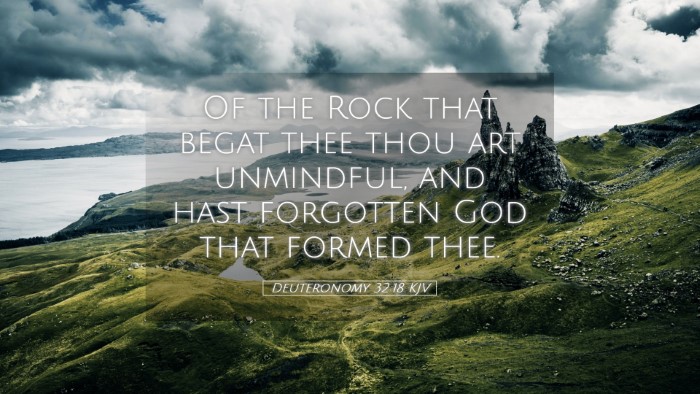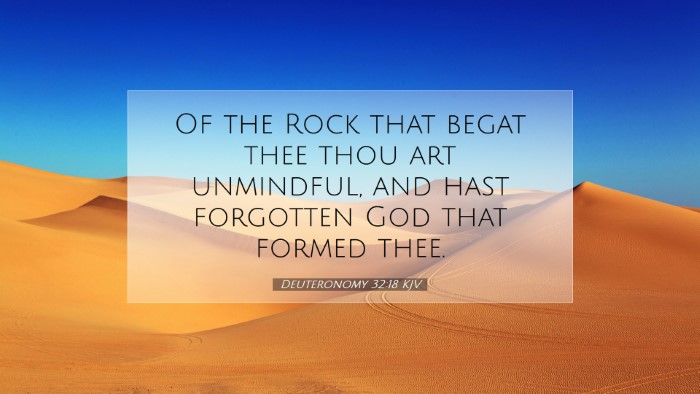Commentary on Deuteronomy 32:18
Deuteronomy 32:18: "Of the Rock that begat thee thou art unmindful, and hast forgotten God that formed thee."
This verse, nestled within the Song of Moses, serves as a profound reminder of Israel's relationship with God—particularly their ingratitude and forgetfulness. The implications of this verse stretch deeply into the concept of covenant and divine parenthood. Below, we examine insights from renowned public domain commentaries.
Contextual Overview
Deuteronomy 32 is a song of witness, a poetic recitation of God’s faithfulness contrasted with Israel's unfaithfulness. Moses, as the bearer of this message, declares the faithfulness of God (the "Rock") alongside Israel's tendency to stray. The chapter overall outlines the consequences of such ingratitude.
Insights from Matthew Henry
Matthew Henry highlights the phrase "Of the Rock that begat thee," emphasizing that God as the Rock signifies stability and strength. He reflects on the idea of God as the Creator who has birthed the nation of Israel, underscoring the nurturing aspect of God's relationship with His people.
- Significance of "Rock": Henry expounds on the use of "Rock" as a metaphor for God's everlasting strength and reliability. It defines God's nature in contrast to human frailty.
- Unmindfulness: He points out that Israel’s unmindfulness is a perpetual danger for believers. Forgetting God's works leads to disobedience and spiritual decline.
- Call to Reflection: Henry calls believers to actively remember their roots and the mercies expressed through God’s creation and deliverance.
Insights from Albert Barnes
Albert Barnes offers a detailed exegesis of "hast forgotten God," framing it within the historical context of Israel's journey. He connects this forgetfulness to a broader theme of idolatry and spiritual apathy.
- Idolatry: Barnes asserts that the forgetfulness of God often leads to the adoption of foreign deities and practices, evident in the historical narrative of Israel's kings.
- Formation and Identity: He emphasizes the pivotal role of divine formation in the identity of Israel, who was uniquely molded by God’s covenantal promises.
- Warning to Future Generations: Barnes warns that neglecting to recognize God’s formative power could lead future generations down a perilous path of secularism and moral decay.
Insights from Adam Clarke
Clarke focuses on the personal implications of forgetfulness of God, interpreting the verse in a spiritual and practical sense. He emphasizes the relational aspect of God as a father figure.
- Fatherly Care: Clarke argues that the metaphor of ‘begat’ implies a deep paternal connection, likening God’s love to that of a devoted parent who supports and sustains.
- Spiritual Amnesia: He addresses that spiritual amnesia signifies a failure to acknowledge God's past provisions and present guidance, leading to a lack of gratitude and worship.
- Plea for Remembrance: Clarke calls for believers to maintain their memories of divine interventions and mercies, as this is essential for a thriving spiritual life.
Theological Implications
The broader theological implications of this verse point to covenant fidelity and the nature of human reliance upon God.
- Covenant Relationship: Reflecting on the covenant aspect, the neglect of God signifies a breach in relationship, hence the call for remembrance serves as both a warning and encouragement.
- Human Nature: This verse illustrates the tendency of humans to forget the sustainer in favor of transient desires—an inherent flaw throughout biblical and church history.
- The Call to Action: Clergy and scholars are encouraged to examine their congregations and teachings, ensuring a constant reminder of God’s goodness and faithfulness.
Conclusion
In conclusion, Deuteronomy 32:18 serves as a critical reminder of the necessity for vigilance against forgetfulness in our spiritual journey. Each commentary underscores the loving but firm admonition from Moses, ringing clear through generations: Remember your Rock, for the path ahead must be navigated with an awareness of God’s mighty acts and nurturing care.


